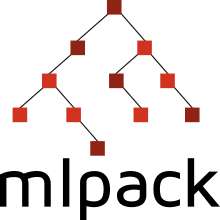mlpack
mlpack is a machine learning software library for C++, built on top of the Armadillo library. mlpack has an emphasis on scalability, speed, and ease-of-use. Its aim is to make machine learning possible for novice users by means of a simple, consistent API, while simultaneously exploiting C++ language features to provide maximum performance and maximum flexibility for expert users.[3] Its intended target users are scientists and engineers.
 | |
| Initial release | February 1, 2008[1] |
|---|---|
| Stable release | 3.3.1
/ April 30, 2020[2] |
| Repository | |
| Written in | C++, Python, Julia |
| Operating system | Cross-platform |
| Available in | English |
| Type | Software library Machine learning |
| License | Open source (BSD) |
| Website | mlpack |
It is open-source software distributed under the BSD license, making it useful for developing both open source and proprietary software. Releases 1.0.11 and before were released under the LGPL license. The project is supported by the Georgia Institute of Technology and contributions from around the world.
Miscellaneous features
Template classes for GRU, LSTM structures are available, thus the library also supports Recurrent Neural Networks.
There are bindings to R, Julia[4], and Python. Its binding system is extensible to other languages.
Supported algorithms
Currently mlpack supports the following algorithms and models:
- Collaborative Filtering
- Decision stumps (one-level decision trees)
- Density Estimation Trees
- Euclidean Minimum Spanning Trees
- Gaussian Mixture Models (GMMs)
- Hidden Markov Models (HMMs)
- Kernel density estimation (KDE)
- Kernel Principal Component Analysis (KPCA)
- K-Means Clustering
- Least-Angle Regression (LARS/LASSO)
- Linear Regression
- Local Coordinate Coding
- Locality-Sensitive Hashing (LSH)
- Logistic regression
- Max-Kernel Search
- Naive Bayes Classifier
- Nearest neighbor search with dual-tree algorithms
- Neighbourhood Components Analysis (NCA)
- Non-negative Matrix Factorization (NMF)
- Principal Components Analysis (PCA)
- Independent component analysis (ICA)
- Rank-Approximate Nearest Neighbor (RANN)
- Simple Least-Squares Linear Regression (and Ridge Regression)
- Sparse Coding, Sparse dictionary learning
- Tree-based Neighbor Search (all-k-nearest-neighbors, all-k-furthest-neighbors), using either kd-trees or cover trees
- Tree-based Range Search
mlpack uses the ensmallen mathematical optimization library for training many of the above models.
See also
- Armadillo (C++ library)
- List of numerical analysis software
- List of numerical libraries
- Numerical linear algebra
- Scientific computing
References
- "Initial checkin of the regression package to be released · mlpack/mlpack". February 8, 2008. Retrieved May 24, 2020.
- "Releases - mlpack/mlpack". Retrieved 11 November 2019 – via GitHub.
- Ryan Curtin; et al. (2013). "mlpack: A Scalable C++ Machine Learning Library". Journal of Machine Learning Research. 14 (Mar): 801–805. arXiv:1210.6293. Bibcode:2012arXiv1210.6293C.
- https://github.com/mlpack/mlpack.jl